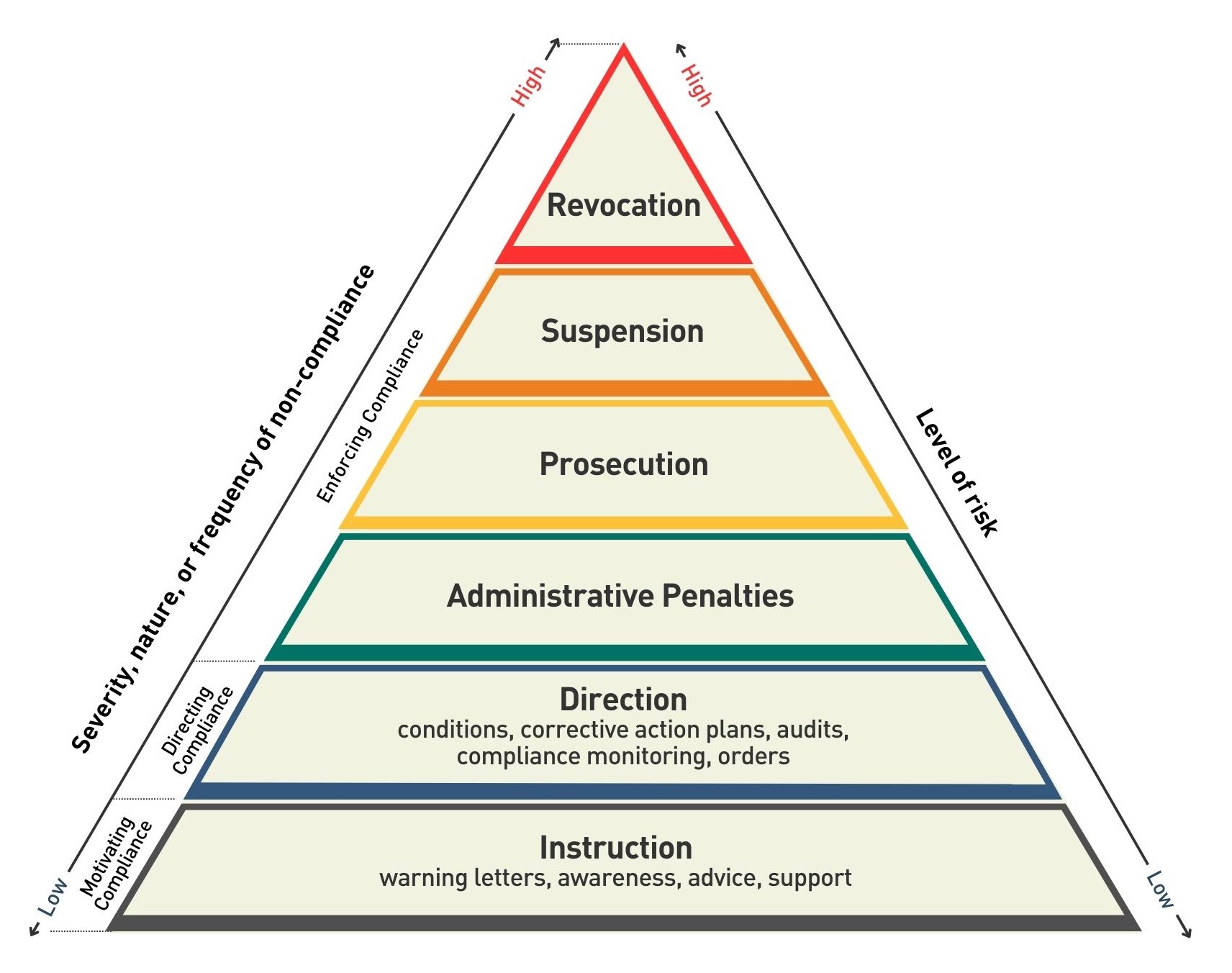ESA Compliance and Oversight Process for Licence Holders
The vast majority of ECRA/ESA Licensed Electrical Contractors (LECs) and Master Electricians (MEs) share ESA’s commitment to safety and compliance. ESA works with all licence holders to motivate compliance and ensure that electrical work in Ontario meets all applicable laws.
Once you obtain your Licenced Electrical Contractor and/or Master Electrician licence, you have an obligation to comply with all applicable laws and the standards of conduct. For more information see:
If it comes to our attention that a licence holder failed to comply with its obligations, the Director of Licensing may take steps to ensure compliance. This diagram shows the types of compliance actions that may be considered by the Director when making decisions:
Compliance Framework
Click on the image to enlarge it full screen. (Opens in a new window.)
Note that the pyramid shows a range of actions the Director of Licensing may take. The type and severity of the action depends on a number of factors. These include the circumstances around the non-compliance, risk factors and compliance history.
How the Compliance/Complaint Process Works
ESA reviews all complaints and reports received about licence holders. As part of this process, ESA’s primary role is to review the information to determine if there was a non-compliance with the requirements of the Act or Regulation and if compliance/oversight action is required.
In its review of complaints, ESA may also be able to facilitate the flow of information between the member of the public and the licence holder, which may assist them in resolving their dispute.
Notice
ESA urges the parties to attempt to discuss and resolve the dispute to their mutual satisfaction prior to making a complaint to ESA.
ESA does not have authority to settle a dispute between a licence holder and their client or to impose a settlement. It does not have authority to act as an arbitrator in any complaint matter.
ESA does not have authority to settle a dispute between a licence holder and their client or to impose a settlement. It does not have authority to act as an arbitrator in any complaint matter.
When ESA receives a complaint against a licence holder or report of a non-compliance, Licensing Department staff will:
- Conduct a review to assess whether the information provided in the report is supported;
- The review may include contacting the complainant, ESA Inspector, Licensed Electrical Contractor and/or Master Electrician to gather information;
- If it is determined that there was a non-compliance by the licence holder, the Director of Licensing may take appropriate compliance action;
- If action is considered, the licence holder will be provided with a written notice; and
- A letter will also be provided to the complainant. Details of any compliance action taken will not be released to the complainant.
Types of Licensing Compliance and Oversight Actions
The Legislation gives the Director, Licensing, the following powers:
- Imposing restrictions, limitations or conditions on the licence;
- Refusing to grant or renew the licence;
- Lay charges and commence a prosecution in the Provincial Offences Court;
- Issue an Administrative Penalty Order for non-compliance;
- Suspending the licence; and
- Revoking the licence.
The licence holder could face other corrective actions aimed to motivate and direct compliance, such as:
- Education: The Director provides information or written material about the licence holder’s duties.
- Monitoring: The Director reviews the licence holder’s business record (Notification history, etc). This ensures that electrical work complies with the Regulation.
- Acknowledgement and Undertaking: This is a written statement from the licence holder that details how they will correct non-compliance.
- Attend a Meeting: The Director may invite the licence holder to meet with representatives from ESA’s Licensing Department. They may receive an informal educational reminder, advice, or warning.
- Training: The Director may ask the licence holder to take professional development or educational courses. For example, they might need training on safe work procedures or the Electrical Code.
- Warning Letter: The Director may issue a written warning, explaining how the licence holder must comply with the Regulation. If the conduct that led to the complaint continues, the Director may take legislative action.
- Other: The Director may consider other appropriate compliance and oversight actions.
Report Unlicensed Electrical Work Anonymously
If you suspect someone is doing electrical work without a licence, let us know.


